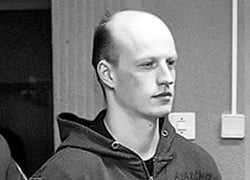Ihar Alinevich spends 30 days in punishment cell
2- 23.10.2014, 13:36
- 10,058

The political prisoner was punished for the refusal to clean toilets.
The parents of Ihar Alinevich visited their son, who marked birthday in prison for the fourth year in a row. The meeting lasted 90 minutes. They were allowed to talk on the phone through a glass barrier. The previous visit was in June. The political prisoner's mother told charter97.org about Ihar and confinement conditions.
– The general impression is hapinness that he is still alive and the feeling that it's a shame to give up and suffer if such men exist. I am happy that I am his mother. I was looking at him and caught myself thinking that he is absolutely calm and even finds something funny in the situation.
Of course, it awful what they do to him. People sometimes ask me: “In what prison do our political prisoners serve their terms?” People think they live in a special facility together. I'd like to say that even in the Soviet Union political prisoners were held together in the same camp. I don't remember that there were so brutal violations of humane conditions of confinement.
Everyone one is held separately either in a correctional facility or in prison. Conditions for inmates of correctional facilities can be tightened without any grounds.
All former prisoners – Seviarynets, Dashkevich, Autukhovich – don't lose their courage despite difficulties. Talks with them revive you. They are really bright people. Ihar does not challenge the system. He just keeps calm. I see on the examples of Khodorkovsky and Solzhenitsyn that the same conditions can break some people, but they can also make others better.
– How did Ihar survive 30 days in solitary confinement?
– I asked him: “How did you live in the cell alone for 30 days without books, paper and a pen?” The bunk where he sleeps is lifted up at 5 a.m. You cannot lie down and sleep, it is forbidden. He says: “It's better. You cannot relax. I thought about many things.” I asked what he did and he answered: “Isolation is often good to put your thoughts in order and think about important things.” He read poems aloud. I asked if he was thinking about the plot of his next book, but he said he had written everything he wanted in his book On the Way to Magadan.
– What helps him in this difficult time?
– Former Polish political prisoners sent him a warm scarf two years ago. Ihar didn't know the history of the scarf, but he tied it as soon as he got it. I said who sent him the scarf and he was happy to hear that. Solidarity means a lot for him. He wore this scarf this time. It's a sort of a talisman for him. I don't know who exactly sent the scarf, but maybe these people read it here. Let's them know that the scarf performs its direct function: it warms up both physically and emotionally in this cold time.
– Were you afraid that the visit could be cancelled?
– We didn't know if we would be allowed to see him. The decision could have been cancelled at any moment.
– Did you give him any warm clothes and food?
– We gave him a bag with food and a bag with other things. He hasn't even had personal hygiene items since his transfer from the old correctional facility. It's strange that we were not allowed to give him slippers and a washbowl. But every facility has its own rules.
– What does Ihar say about the confinement conditions?
– He says the rules for all inmates become stricter every day. He must file an application and collect a number of signatures to make a phone call. He made just one call for the last 6 months. He wrote in his book: the past exists only in your memories, the future – in your imagination, but what you have is here and now. The visit was here and now for us. I was happy to see him alive and healthy.
On May 27, 2011, judge of Minsk's Zavadski district court Zhanna Khvainitskaya sentenced Ihar Alinevich to 8 years in a medium security correctional facility. He serves his term in correctional facility No.10 in Navapolatsk. Mikalai Dziadok, Aliaksandr Frantskevich and he were charged with organising a picket near the Ministry of Defence, attacking Shangri La casino and a detention centre in Akrestsin Street and setting the door of a Belarusbank office on fire.










